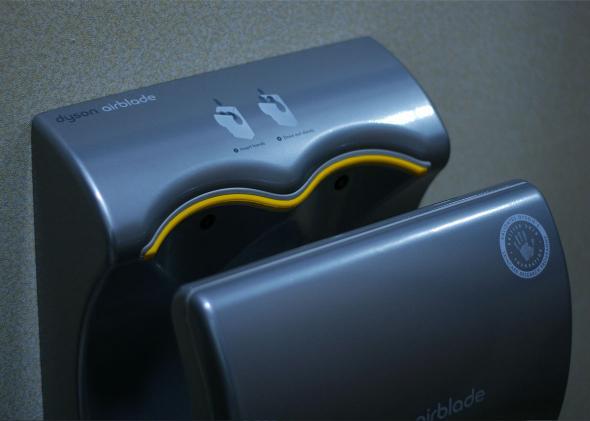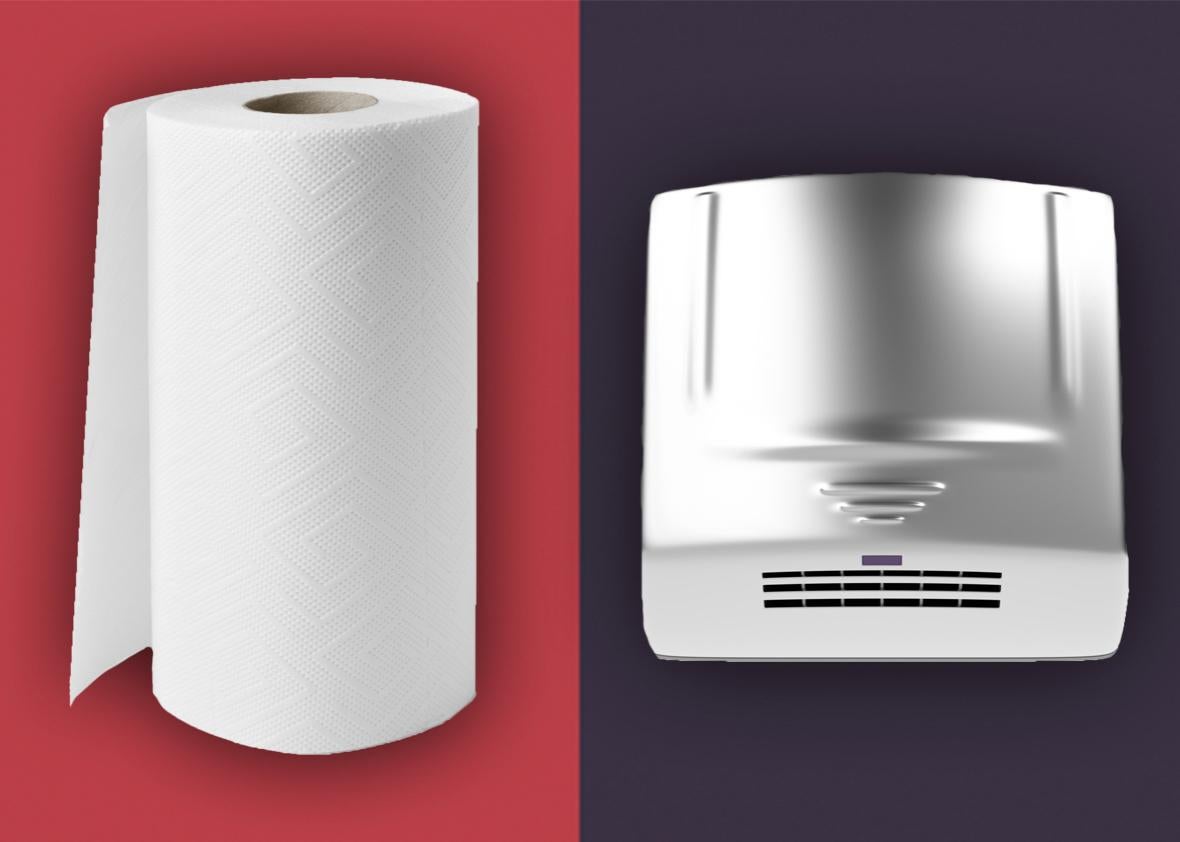Are you going to lecture me about saving the environment?
Actually, no. We’re reasonably sure that using hand dryers is in fact the way to go if you’re looking to help out the environment. But that’s not why we’re here.
So why are we here?
Because a recent study found that using certain hand dryers spreads 1300 times as many germs around the bathroom as drying with a paper towel.
… That actually sounds like a lot? Which hand dryers and how do I avoid them?
It does, but let’s back up. Writing in the Journal of Applied Microbiology a duo of microbiologists from the University of Westminster, London, compared the bacteria-spreading abilities of paper towels, regular warm-air dryers, and Dyson jet-air dryers—the kind that makes you stick your hands into them instead of just below.
These?

Marcin Wichary/Flickr
Yes, those.
Good to know.
Actually, hear me out. To test the idea, the researchers dipped subjects’ gloved hands into a soup of MS2 virus—a bacteria-inhabiting virus that’s harmless to humans but useful for proof of principle. When they applied the triad of drying methods to these virus-smothered hands, they found that Dyson’s powerful jet-air dryers were disseminating 60 times as much of the virus as regular warm-air dryers and 1300 times more than paper towels, from the subjects’ hands into the air. With its forceful 400 mph jet stream, the Dyson Airblade also spewed it faster and farther than any other drying method, the researchers found.
That sounds like the elevator pitch for Contagion 2.
That’s basically how the media read it. The study’s results produced headlines that described jet-air dryers variously as virus catapults, germ factories, and viral bombs. The researchers also found that most of the bacteria ends up spewing right at the height of a child’s face.
This is not making me feel any better.
Right—but there are several other things to keep in mind. First is that the researchers conducted this test … bizarrely. They loaded unrealistic amounts of virus onto the subjects’ hands. “The amount of virus is enormous, huge, gargantuan—a massive, massive load,” says Jon Otter, a U.K. epidemiologist and the interim head of operations for Infection, Prevention, and Control for Imperial Hospitals, which covers a group of five major hospitals in London. Oh and also, in their hand-washing test, they completely excluded the washing step: After dipping their hands into the virulent broth of MS2, the subjects seem to have merely simulated washing by shaking their hands a bit before plunging them straight into the dryer. That hardly reflects most people’s bathroom behavior. (We hope.)
So the researchers weren’t big on the reality factor?
Nope. In fact, Otter thinks it’s plausible that the differences between drying methods could in fact be fairly minimal if the researchers had accounted for the fact that most bathroom visitors do at least vaguely try to wash their hands. Also, in the real world, those virus levels would be much, much lower—and if you start out with not that much, even 1300 times not that much is still not all that much.
Why did these researchers create such a weird test?
To answer that, you’ll need a bit of background—and for that we’ll have to drop briefly into the odd rabbit hole that is paper towel vs. air dryer research.
I’m shocked such a thing exists.
So were we.
OK, I’m ready.
The question of paper towel vs. dryer hygiene has been running for over a decade, but things really got heated in 2008, when Dyson attempted to make the case that its air dryers were cleaner than any other method of drying one’s hands. Their defence hinges on the Airblade’s core design feature: the high-efficiency particulate arresting, or HEPA, filter, which sucks in air and sifts out 99.9 percent of bacteria so that the air striking a user’s hands is almost completely free of germs. In 2008, Dyson’s dryer became the first to be endorsed for its superior hygiene by Britain’s Royal Society for Public Health. Studies Dyson has commissioned since then show that the Airblade’s high-speed blasts, plus its patented filter, combine to keep hands freer of bacteria than regular warm-air dryers.
So hand dryers actually are actually more hygienic?
Not so fast. Research funded by the paper towel industry counters these claims. Industry consortiums like the European Tissue Symposium, an organization representing the trade interests of tissue paper manufacturers, have pushed back with studies showing that jet-air dryers actually increase bacteria on the hands from between 42 percent to almost 200 percent, while paper towels reduce it up to 77 percent.
I’m sorry, but there’s a paper towel lobby?
I mean, think about how many times you go to the bathroom in one day. It’s a profitable business.
That was needlessly personal. But fine, continue.
For the paper towel believers, the argument is based on the idea that any residual germs hanging out inside the dryer or lingering on a user’s hands are forcefully blasted into the surrounds by powerful winds—whereas plain old paper towels obviously don’t pose this risk. They keep the germs more or less contained and it all ends up in the trash.
It kind of sounds like they have a point?
It’s true, the paper towel people sort of have a point.
So which is it? I need answers!
We’re getting there. As Otter explains, Dyson’s “clean air” argument misses the point. It’s pretty widely accepted that regardless of how clean the air they’re blowing out is, dryers disseminate the germs on one’s hands, and elsewhere, by blowing them around. Also, hand dryers may aid germ spread by collecting pools of bacteria-infused water from users dripping on the machine, then blasting them into the room. And if dryers take too long to get the job done a user is more likely to grow impatient and leave with still-damp digits. That’s actually the worst scenario—since germs are transmitted more easily via damp hands.
Duly noted. Though I’m sensing an impending but?
Yes, here’s the point we’ve been building up to: The thing of real importance is whether the amount of germs hand dryers have the potential to spew is actually enough to make people sick.
Well, is it?
Under most circumstances, probably not. In reality the pathogenic load in the average public bathroom is likely to be much lower than what’s shown in the study. “For all of these bugs you need a pretty large infectious dose to get sick,” says Val Curtis, director of the Environmental Health Group at the London School of Hygiene and Tropical Medicine, which does research on hygiene and sanitation. So even if germs are being spread about—which they will be when an air-blasting machine is involved—that won’t necessarily amount to an illness.
So it’s hurray for hand dryers then?
Yes, for everywhere but places where there are tons of germs and tons of sick people—meaning hospitals. In the medical profession it’s generally accepted that hand dryers should be kept out of clinical settings where there may already be a lot of pathogens circulating and where they’d have the potential to infect already-vulnerable patients. Next time you’re in a hospital, you might notice the lack of hand dryers.
But anywhere else, it’s OK to use either?
Yes. But that comes with a disclaimer: Wash your hands. Like, really wash your hands. For the most part, cleaning them with soap—which attaches to germs and sluices them down the drain—solves the problem, Curtis explains. “Even just washing hands not that well gets rid of most of it,” she says. “Wash your hands with soap. If you’re still concerned, wash yourself with soap a bit better.”
Go on, give me a nice, pithy takeaway.
Air dryers aren’t perfect, but they’re hardly viral bombs of destruction either. Whatever your preference—dryer or towel—the best weapon against germs, it turns out, is hand soap.
So basically vigorous hand washing is the answer to excessive fearmongering?
In this instance, that would appear to be the case.
